Gopalpur-by-the-Sea!
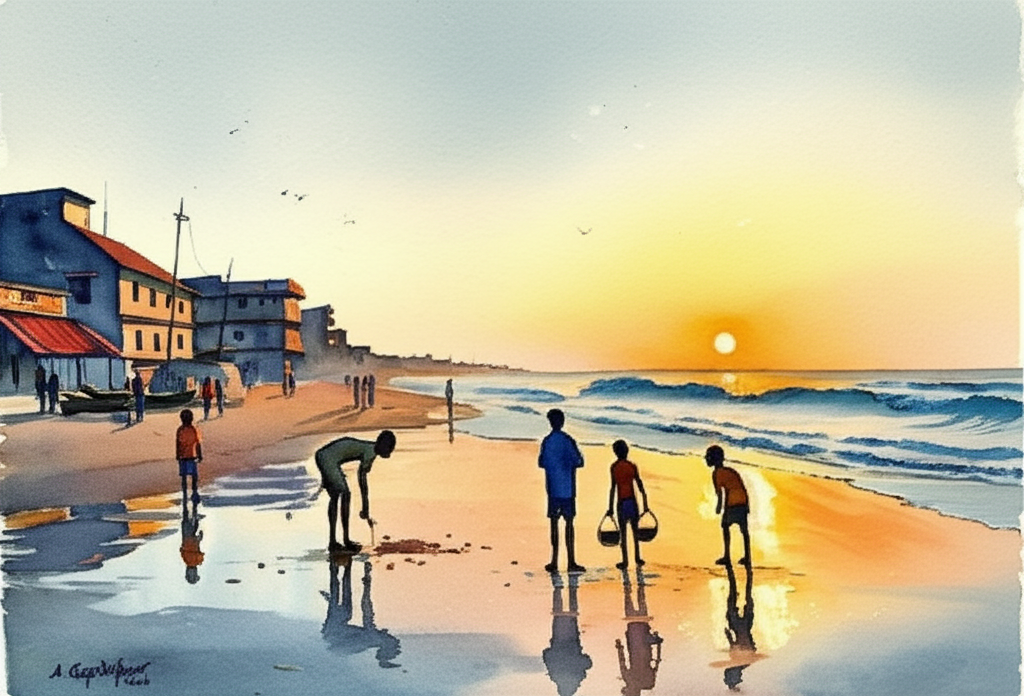
It’s a name that sounds magical! When I was a kid, my dad and his friends would talk about it. They said it was a cute little beach town with a small harbor on the coast of Orissa. Years went by, and I grew up, but I still only knew it as a place I’d heard about and dreamed of, but never visited.
Until last month! I was visiting KiiT International School in Bhubaneswar, and someone asked me where I wanted to go. I said, ‘Is Gopalpur very far?’
And off I went! We drove along a road lined with palm trees, through small, busy towns with funny names like Rhamba and Humma. We passed the huge Chilika Lake, which flows into the sea, and through fields of rice and keora trees. Finally, we arrived at the beach road in Gopalpur, with the sun shining like gold on the big ocean waves. Fishermen were counting their fish, and kids were running into the sea, splashing around in the shallow water.
But the beach area looked a little sad. The hotels were empty, and the cafes had no customers. A noisy crow squawked at me from an old, worn-out wall. Some of the buildings were new, but there were also old, broken-down buildings all around us. Nobody was going to fix them up. A small house called ‘Brighton Villa’ was still standing.
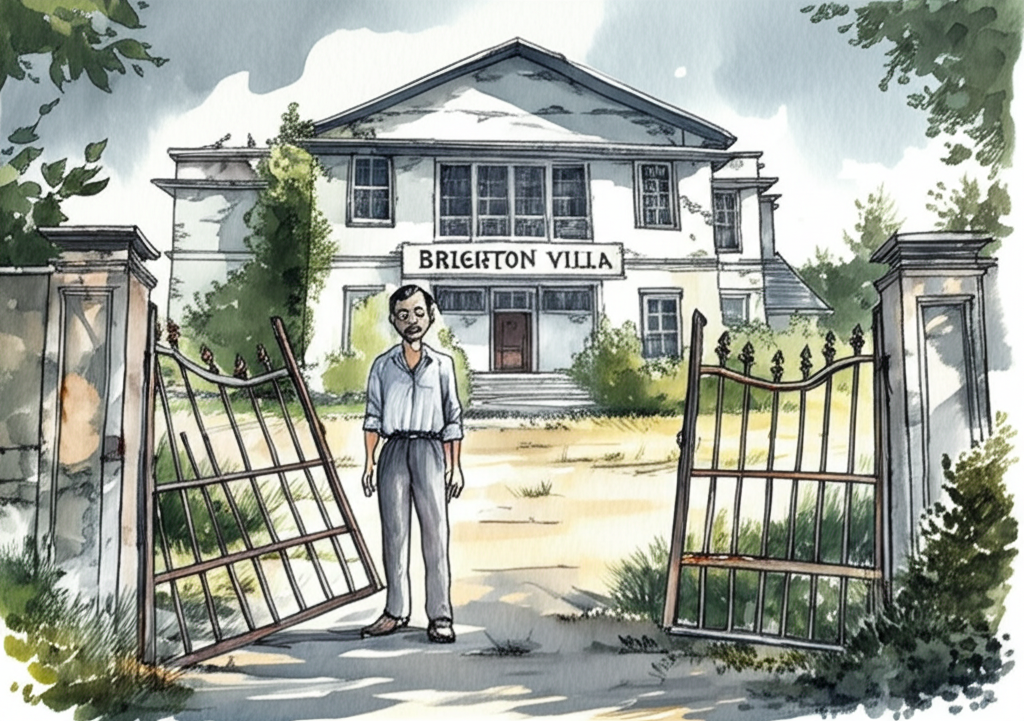
Away from the beach, a road with trees on both sides led us past some nice houses, a school, an old graveyard, and finally, a rest house where we would sleep for the night.
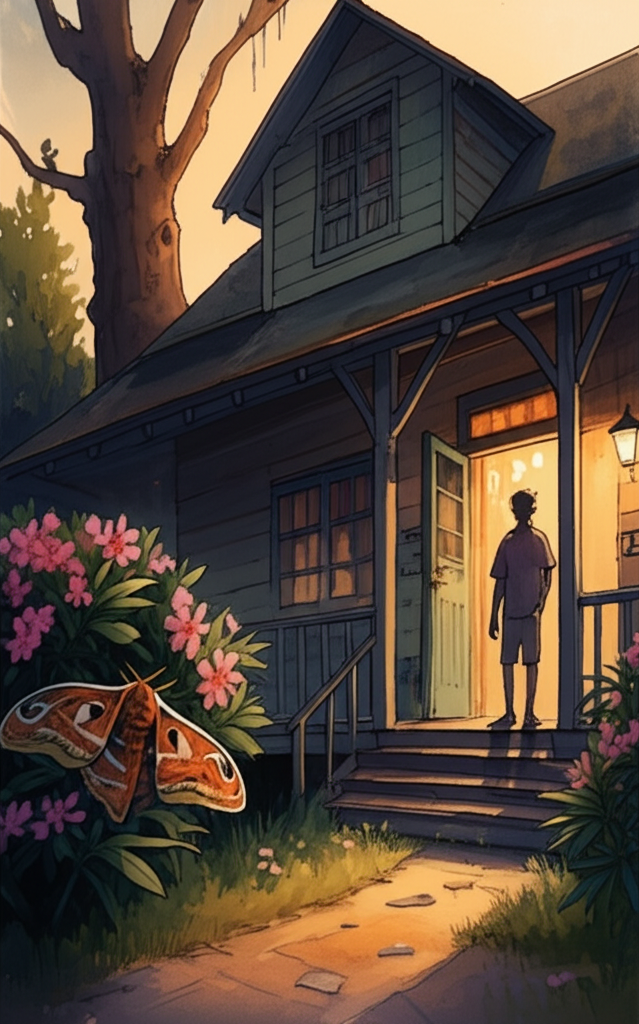
It was getting dark when we got there. In the dim light, I could see the shapes of the trees around the old house – a big, old banyan tree, a jackfruit tree, and lots of mango trees. The light from the house porch shined on some oleander bushes. A big moth landed on my shirt and didn’t want to leave! I gently picked it up and put it on the oleander bush.
It was almost midnight when I went to bed. The rest-house workers – the caretaker and the gardener – made me a nice dinner, but it took a long time. The gardener told me that the house used to belong to a British man who left India a long time ago. They had made some changes, but the house was still mostly the same – rooms with high ceilings and windows in the roof, a long porch, and huge bathrooms! The bathroom was so big, you could have a party in there! But there was only one toilet and a sink. You could sit on the toilet and think about things (or nothing at all!) while looking at the sink far away.
I closed all the doors and windows, turned off all the lights (I can’t sleep with a light on!), and went to bed.
The bed was comfy, and I fell asleep quickly. But then, I woke up because something was tapping lightly on the window near my bed.
‘It’s probably just a branch from the oleander bush,’ I thought, and went back to sleep. But then there was more tapping, louder this time, and I woke up completely.
I sat up in bed and pulled back the curtains.
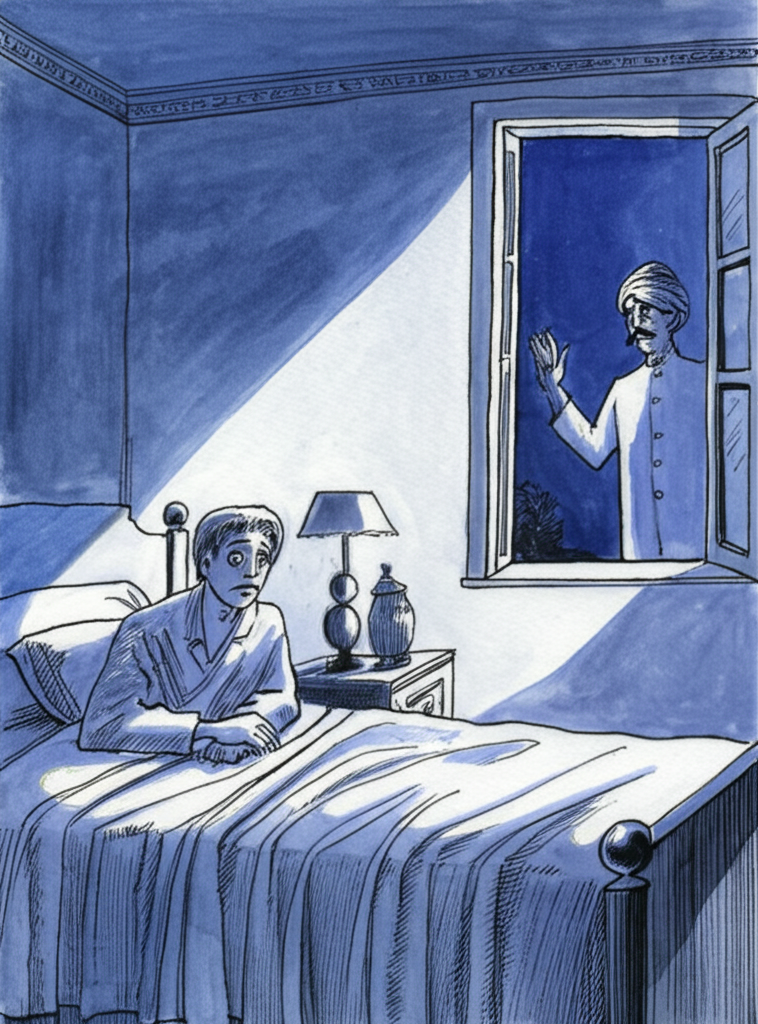
There was a face at the window!
In the dim light from the porch, I couldn’t see the face clearly, but it was definitely a person.
‘Someone must want to come in,’ I thought. ‘Maybe the caretaker or the watchman. But why didn’t they knock on the door?’ Maybe they did, but I didn’t hear it. The door was far away at the other end of the room.
I don’t usually open my door to strangers at night, but I didn’t feel scared or worried, so I got up, unlocked the door, and opened it for my midnight visitor.
A very impressive person was standing in the doorway!
A tall, dark man, wearing a turban and all white clothes. He looked like he was wearing a uniform – like the fancy doormen at expensive hotels. But you don’t usually see that in Gopalpur-by-the-Sea.
‘What do you want?’ I asked. ‘Are you staying here?’
He didn’t answer, but looked past me, maybe even through me! Then he walked silently into the room. I stood there, surprised and amazed, as he walked over to my bed, smoothed out the sheets, and patted my pillow. Then he went to the next room and came back with a glass and a jug of water, which he put on the table next to my bed. And then, he picked up my clothes, folded them neatly, and put them on a chair! Then, just as quietly and without even looking at me, he left the room and walked out into the night.
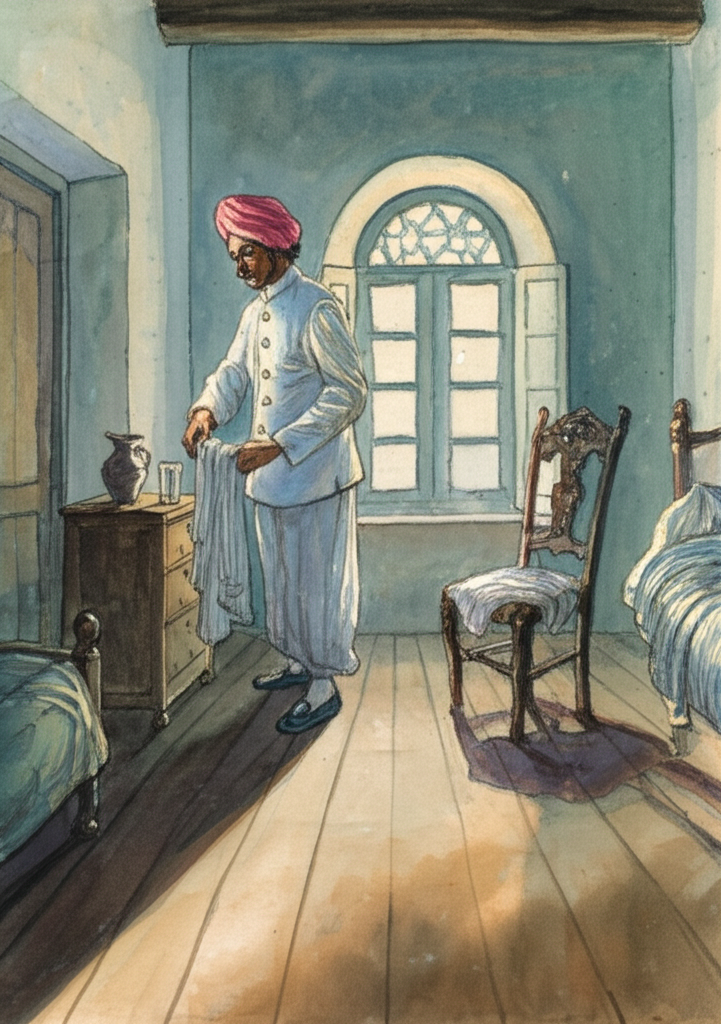
Early the next morning, when the sun rose like a big explosion over the Bay of Bengal, I went down to the sea again. I had to step carefully over some puddles on the beach. Well, you can’t have everything! The world might be prettier without people, but then, who would enjoy it?
Back at the rest house for breakfast, I remembered my visitor from the night before.
‘Who was that tall man who came to my room last night?’ I asked. ‘He looked like a butler. Very well-dressed and polite.’
The caretaker and the gardener looked at each other in a knowing way.
‘You tell him,’ the caretaker said to the gardener.
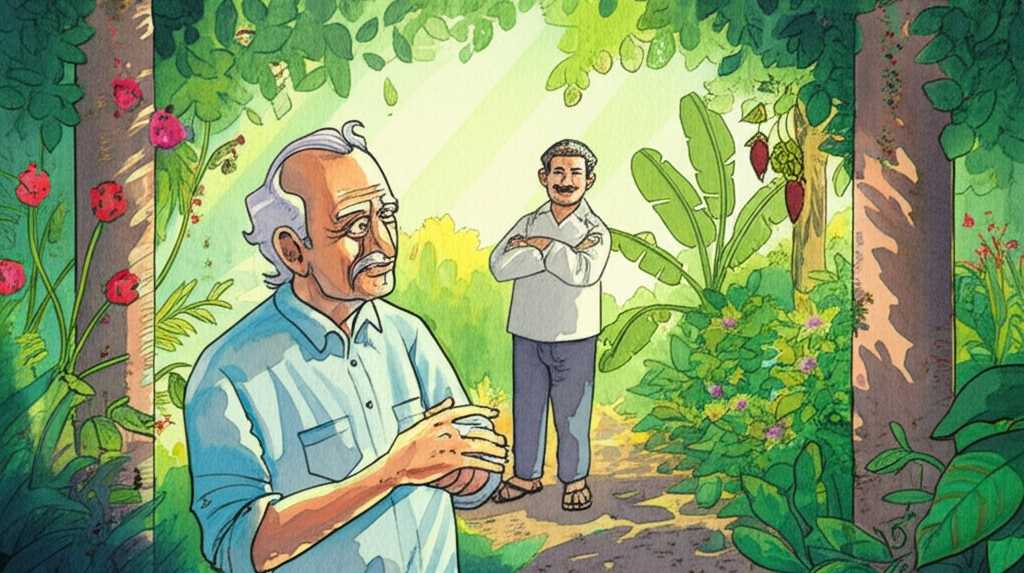
‘It must have been Hazoor Ali,’ said the gardener, nodding. ‘He was the helper, the personal servant of Mr. Robbins, the boss of the harbor – the British man who used to live here.’
‘But that was over sixty years ago!’ I said. ‘They must all be dead!’
‘Yes, they are all dead, sir. But sometimes Hazoor Ali’s ghost appears, especially if one of our guests reminds him of his old boss. He was very loyal to him, sir. In fact, he got this house as a present when Mr. Robbins left the country. But he couldn’t take care of it, so he sold it to the government and went back to his home in Cuttack. He died a long time ago, but he still visits this place sometimes. Don’t be scared, sir. He doesn’t mean any harm. And he doesn’t appear to everyone – you are the lucky one this year! I’ve only seen him twice. Once, when I started working here twenty years ago, and then last year, the night before the big storm. I think he came to warn us. He went to every door and window and made sure they were closed tight. He never said a word. He just disappeared into the night.’
‘And it’s time for me to disappear by day,’ I said, getting my things ready. I had to be in Bhubaneswar by late afternoon to catch my plane to Delhi. I was sad that my visit was so short. I would have liked to spend a few more days in Gopalpur, exploring its rivers, old roads, mango trees, fishing villages, and sandy beaches. Maybe another time! In this life, if I’m lucky. Or in the next, if I’m even luckier!
At the airport in Bhubaneswar, the security guard asked me for my ID. ‘Driver’s license, ID card, passport? Anything with your picture on it will work, since you have an online ticket,’ he explained.
I don’t have a driver’s license and I never carry my ID card with me. Luckily, I always take my passport when I travel. I looked for it in my small travel bag and then in my suitcase, but I couldn’t find it! I felt embarrassed as I searched through all my pockets, when another officer came to help. ‘It’s okay. Let him in. I know Mr. Ruskin Bond,’ he said, and waved me through. I thanked him and hurried to the check-in area.
During the whole flight, I was trying to remember where I might have put my passport. ‘Maybe it’s hidden somewhere inside my suitcase,’ I thought. Now that my bags were locked up at the airport, I decided to look for it when I got home.
A day later, I was back home in the hills, tired after a long road trip from Delhi. I like traveling by car because there’s so much to see, but there’s so much traffic that it feels like a race most of the time! And to make things worse, my passport was still missing! I looked everywhere – my suitcase, travel bag, all my pockets.
I gave up. Either I had dropped it somewhere, or I had left it in Gopalpur. I decided to call the rest house and ask the workers about it the next day.
It was a cold night, freezing cold, so I went to bed early, covered with a thick blanket. Just two nights before, I had been sleeping with a fan on!
It was a windy night. The windows were shaking, and the old tin roof was creaking. A loose piece of metal was flapping around and making a terrible noise.
I didn’t sleep well.
When the wind died down, I heard someone knocking on my front door.
‘Who’s there?’ I called, but nobody answered.
The knocking kept going, getting louder and louder.
‘Who’s there? Who is it?’ I called again.
Only knocking.
‘Someone must need help,’ I thought. ‘I should see who it is.’ I got up, shivering, and walked barefoot to the front door. I opened it slowly, opened it wider, and someone stepped out of the shadows.
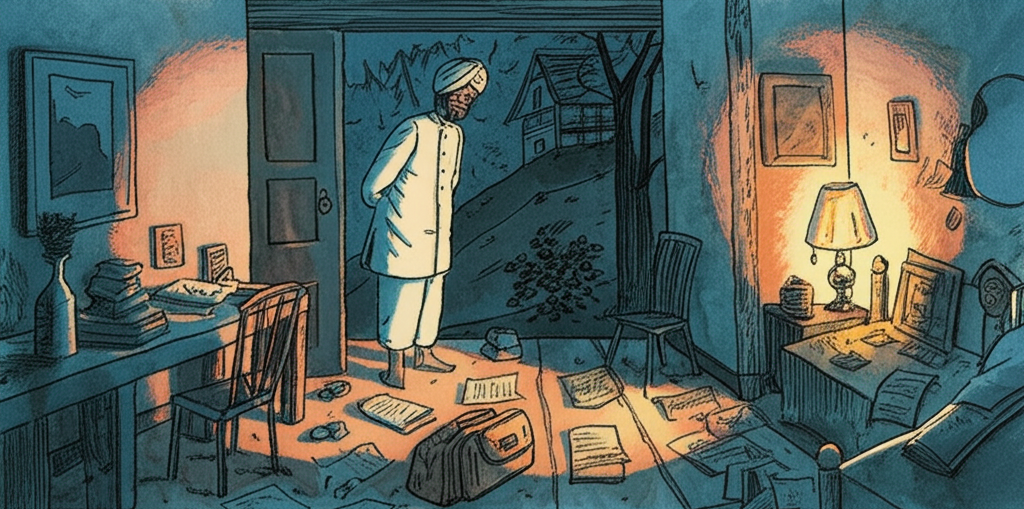
Hazoor Ali bowed, entered the room, and just like in Gopalpur, he walked silently into the room. It was a mess because I had been frantically searching for my passport. He straightened up the room, took my clothes out of my travel bag, folded them, and put them neatly on the cupboard shelves. Then he bowed again and waited at the door.
‘That’s strange,’ I thought. ‘If he cleaned up the whole room, why didn’t he put the travel bag in its place? Why did he leave it on the floor?’ Maybe he didn’t know where to put it. He left the last bit of work for me. I picked up the bag to put it on the top shelf. And then, my passport fell out of the front pocket and onto the floor!
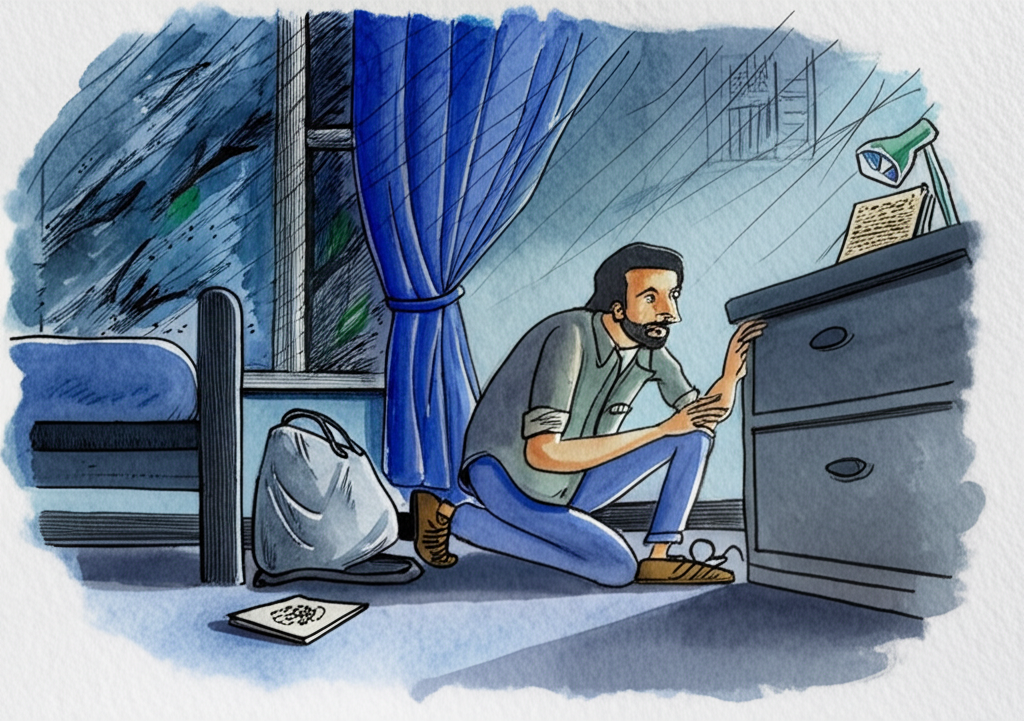
I turned to look at Hazoor Ali, but he had already walked out into the cold darkness.